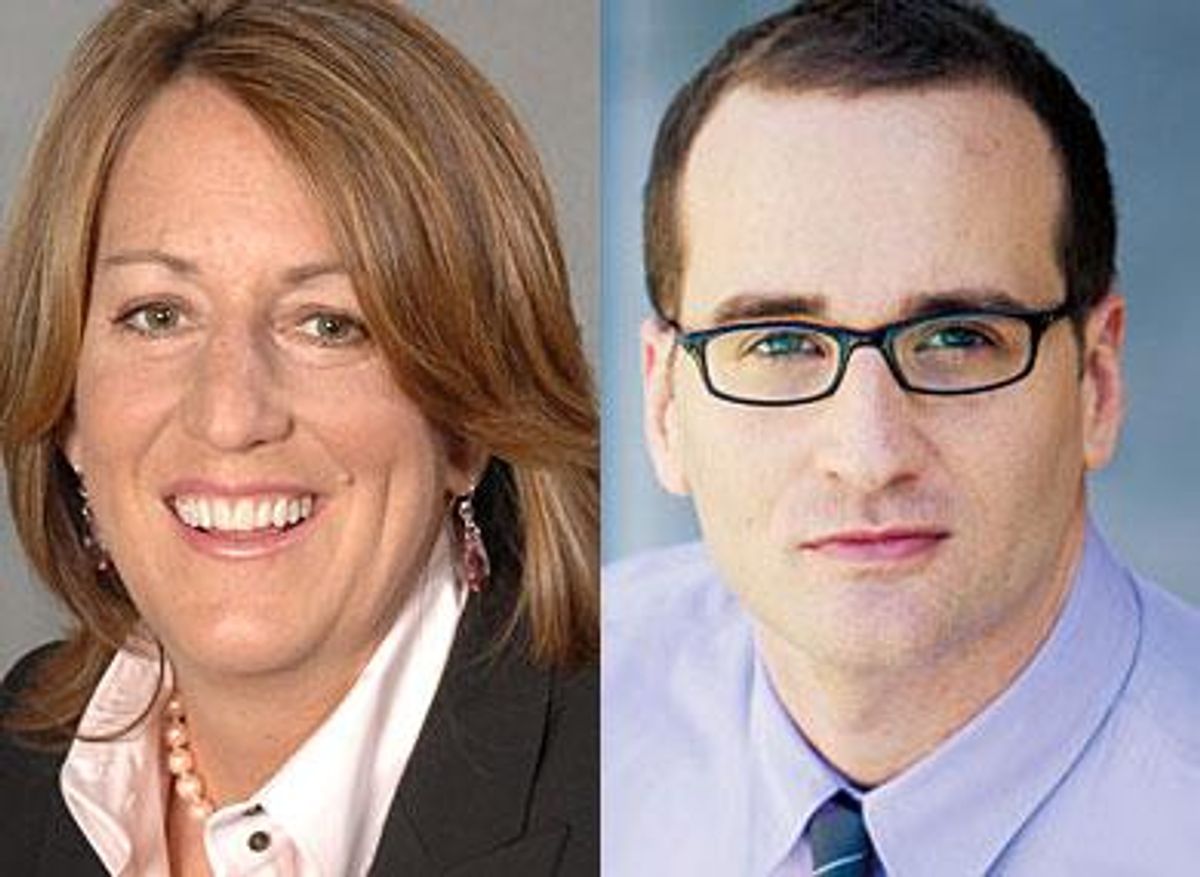The leader of one of the three LGBT rights groups who have butted heads with the plaintiffs in the federal lawsuit to overturn California's Prop. 8 insisted today that the movement to promote same-sex marriage is not about to fall apart -- even as she charged the organization behind the lawsuit with throwing "baffling" and "ludicrous" accusations at her and her fellow activists.
Kate Kendell, the executive director of the San Francisco-based National Center for Lesbian Rights, vigorously defended a motion to intervene in the lawsuit which she filed last Thursday alongside Lambda Legal and the American Civil Liberties Union.
The ostensible purpose of the motion is to open the case to a wider variety of gay and lesbian experiences than those of the four named plaintiffs, and thus provide U.S. District Judge Vaughn Walker with more of the evidence he says he seeks as a basis for both his own ruling and also future appellate rulings.
The three LGBT rights groups acted, however, against the will of the plaintiffs and their superstar team of lawyers headed by Ted Olson and David Boies. Even before the motion was filed, Chad Griffin of the American Foundation for Equal Rights -- the organization behind the lawsuit -- wrote a letter accusing Lambda, NCLR, and the ACLU of seeking to undermine the Olson-Boies team's efforts with their intervention and so diminish their chances of success.
Kendell insisted that was nonsense. "The letter is baffling," she told Advocate.com. "The accusation that we would be somehow in a case with such enormously high stakes for our community to lose the case, or diminish its chances of success, is so ludicrous as to be difficult to take seriously.
"Our entire collective history has been about an unfettered commitment to winning equalityaEUR| in every venue and by any means possible, and we bring that same steadfast dedication to this lawsuit. We are seeking to intervene for one reason and one reason only, and that is to increase the likelihood of success."
Many supporters of marriage equality have reacted with alarm at the very public disagreement over the federal lawsuit, and some of the movement's leaders have worried privately that one or both sides is choosing to put its own institutional interest before the bigger goal of achieving marriage equality as quickly and as smoothly as possible.
Kendell insisted, however, that the public fallout -- she called it a "little dust-up" -- between the three groups and the Olson-Boies team was just a manifestation of lawyerly ego and natural competitiveness, and that all sides would end up working harmoniously together. "We've all been in the middle of conversations where we have disagreed and then gone on to fight shoulder to shoulder as brothers and sisters, completely united," she said. "And I have no reason to think that that won't be the case in this litigation. This is a disagreement among friends."
She chose her words very carefully when asked why NCLR, Lambda, and the ACLU chose to go against the express wishes of the Boies-Olson team rather than trying to hammer out a compromise behind the scenes. "We made clear our intention to intervene, particularly given the nature of the record that the court desired," she said. "Counsel for plaintiffs indicated they were leaning toward opposing the motion and we essentially, as sometimes happens on this particular point, agreed to disagree."
The intervenors' motion says, among other things, that the lawsuit as it stands has the "potential" to fail to protect the interests of certain LGBT rights groups. Kendell insisted, however, that this did not mean she did not have confidence in the abilities of Olson and Boies to litigate the case in federal court.
"I want to be absolutely clear about that," she said. "We have nothing but respectaEUR| for Ted Olson and for David Boies. Our argument is a very simple oneaEUR| The judge in this case made very clear that he wishes to develop a factual record on virtually every key issue that has been a stumbling block to winning marriage equality, and our three organizations have litigated every single one of those issues in one forum or another.
"That experience will be invaluable and indeed, we believe, essential in developing a kind of record that is most likely to assure victory as the case inevitably goes up on appeal."
NCLR and the other groups made clear they did not support the idea of a federal lawsuit before it was filed, and Kendell made a point of mentioning that NCLR was not told about it ahead of time. All now say, however, that they want to be a part of it -- whether the Boies-Olson team is happy about their participation or not.
James Essex, a lawyer with the ACLU, told Advocate.com: "While there have been differences of opinion in the past whether to jump into this particular pool, we are all in it now. Whether we are in this lawsuit or not, this lawsuit is going to decide the issue for all [our] members, and for every LGBT person in the countryaEUR| Once we are all in it, I can't see any reason to think why any of these organizations would want this to fail. We want it to succeed."


















































































